Introduction ……………………………………………………………………… Purpose ……………………………………………………………………… NIPSEA Global Code of Conduct ………………………………………………… NPCP Code of Conduct …………………………………………………………… Vision ………………………………………………………………………………… Mission …………………………………………………………………………………. Quality Policy ……………………………………………………………………… Environmental Policy …………………………………………………………… Nippon Paint’s Lean for Growth Six Core Values …………………………… Specific Guidelines …………………………………………………………… 1. Working with One Another ………………………………………………... 1.1 Treatment of Fellow Employees ………………………………………………………. 1.2 Harassment and Violence at the Workplace ………………………………. 1.2.1 Safe Spaces Act (Bawal Bastos) Policy and Procedure ………. 1.2.2 Sexual Harassment Policies and Procedures …………………… 1.2.3 Violence Against Women and Children Policy ……………………. 1.2.4 Comprehensive Women’s Rights Implementing Rules and Regulations 1.3 Alcohol-Free, Smoke-Free, Dangerous Drug Policy, and Gambling …………. 1.3.1 Alcohol Free Workplace Policy and Procedure ………. 1.3.2 Smoke-Free Workplace Policy and Procedure ………. 1.3.3 Dangerous Drug Policy ………………………………… 1.3.4 Gambling …………………………………………….. 1.4 Environmental, Occupational Safety and Health …………………….. 2. Avoiding Conflicts of Interest 2.1 3. 4. 5. 6. 7. …………………………………………………... Conflict of Interest Policy and Procedure ……………………………………………... Bribery and Corruption ……………………………………………………………... Anti-Money Laundering ……………………………………………………………… Receiving Gifts or Other Benefits Given by Interested Parties …………………… Confidentiality ………………………………………………………………………… Other Acts of Misconduct …………………………………………………… 7.1 Philosophy on Discipline ………………………………………………………….. 7.2 Administrative Procedures ……………………………………………… 7.3 Grievance Procedures ……………………………………………… 7.4 Offenses and Imposable Penalties ………………………………….. 7.4.1 Attendance and Punctuality ………………………………….. 7.4.2 Safety, Environment, Security and House Keeping ………….. 7.4.3 Employee Relations ………………………………….. 7.4.4 Company / Employee Property ……………………… 7.4.5 General Rules and Principles ……………………… Reporting of Violations ……………………………………………………………… 1. 2. Non- Retaliation Policy and Procedure Whistle Blowing Policy and Procedure ……………………………………………… ……………………………………………… Compliance with CEBC ……………………………………………………………… Responsibilities After Leaving Nippon Paint ……………………………… Statement of Compliance …………………………………………………… 1
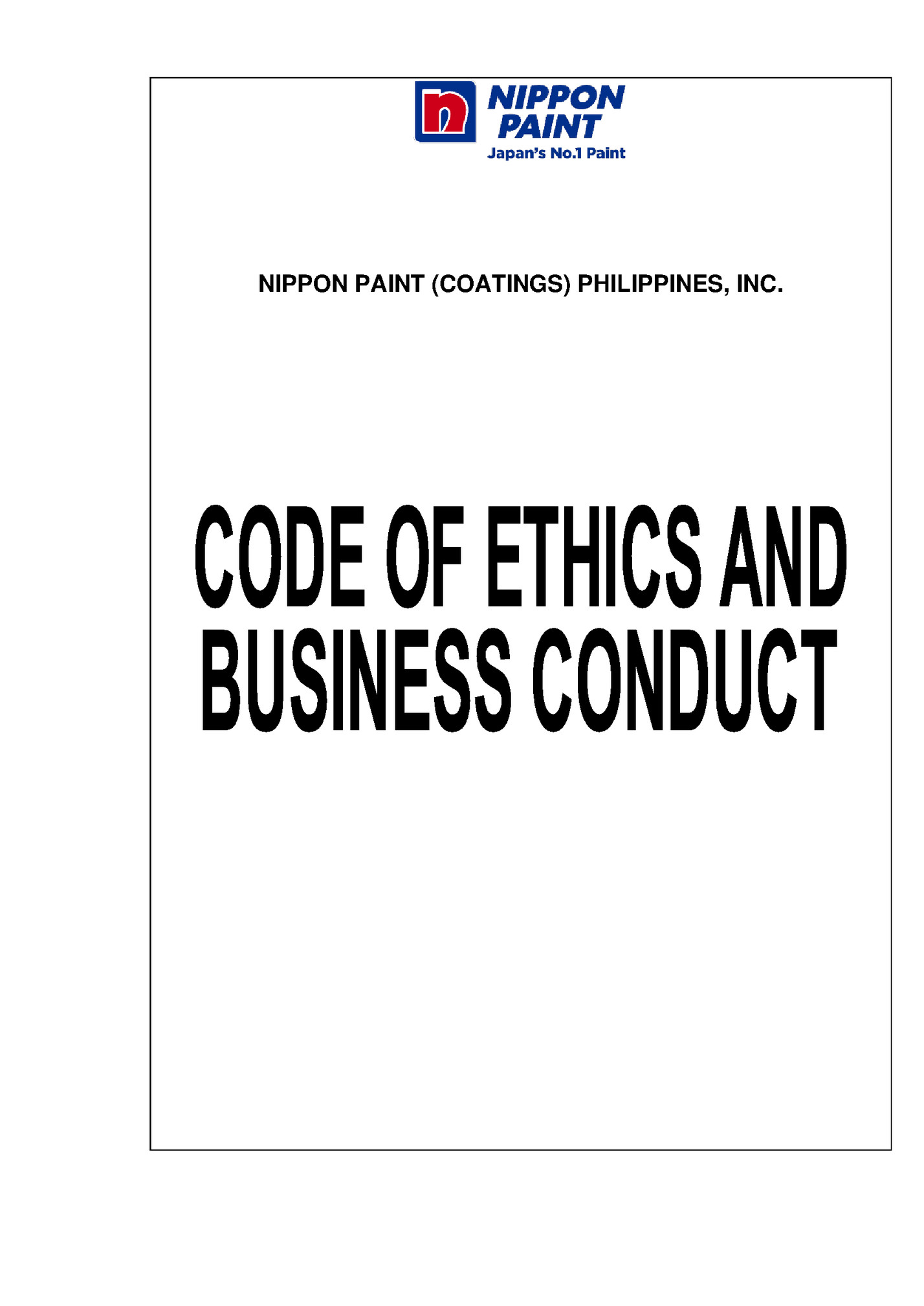
Nippon Paint (Coatings) Philippines, Inc. is guided by the highest ethical standards of honesty, integrity, and accountability in the conduct of its business. This Code of Ethics and Business Conduct serves as a statement of the Company’s ethical beliefs, values, and commitment as well as moral guide to the day-to-day business and professional activities and endeavors of all employees and other persons associated with or representing the company. This code covers a wide range of business and professional practices and procedures, but is by no means exhaustive. However, by adhering to this policy handbook, employees will be able to demonstrate their commitment towards the Company’s goal of practicing and implementing ethical standards. PURPOSE The purpose of this Policy Handbook is to: • Set forth the basic principles to guide employees in their day-to-day business / professional activities as part of the Company; • Promote compliance with applicable laws, rules and regulations; • Promote honest and ethical conduct, including the ethical handling of actual or apparent conflicts of interest between personal and professional relationships; • Promote avoidance of conflicts of interest, including disclosure to an appropriate or authorized person of any transaction or relationship that could reasonably be expected to give rise to such a conflict; • Promote the prompt internal reporting to an appropriate person of violations of this Policy Handbook; • Promote accountability for adherence to this Policy Handbook; • Promote fair dealing with the Company’s stakeholders, customers, suppliers, competitors, and employees; • Protect the confidentiality of corporate information; • Promote the protection and proper use of corporate assets and opportunities; Provide guidance to Company Personnel to help them recognize and deal with ethical issues; • Provide a mechanism to report any illegal or unethical conduct; and • Help foster the Company’s culture of honesty, integrity, and accountability. NIPSEA GLOBAL CODE OF CONDUCT DEALING WITH INTEGRITY We maintain our reputation by conducting our business in a fair and honest way We compete fairly We market responsibility We conduct business ethically We comply with laws, regulations and maintain accurate records We do not tolerate bribery or corruption We avoid conflicts of interest and are responsible to act sensibly with gifts and entertainment We prohibit insider training We do not compromise on quality or safety We protect our asset and confidential information We use technology and innovation to enhance and enrich WORKING TOGETHER We care and work as a team to ensure the safety and well-being of all our stakeholders We care about people We work as a team We embrace diversity We treat each other and our stakeholders fairly We provide a safe and healthy workplace free from harassment and discrimination We act in the best interest of the company We work collaboratively with our partner companies for the greater good REPSECTING COMMUNITIES AND ENVIRONMENT We respect and enrich the environment and communities that we operate in We embrace social and environmental responsibility We respect human rights, including supporting all efforts to eliminate forced labor or child labor We strive to reduce the environmental impact of what we do We aim to leave a positive and sustainable footprint 2
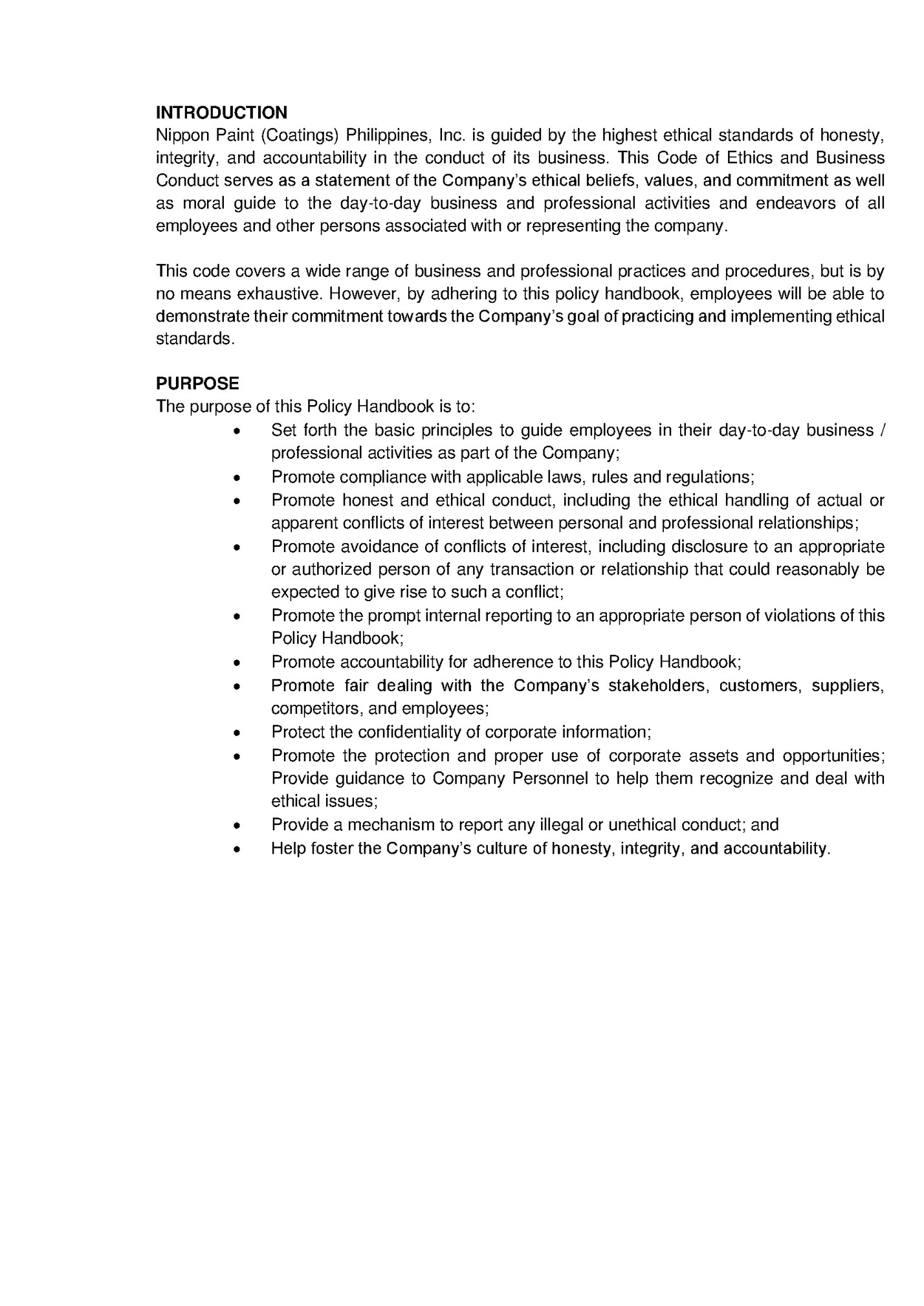
Nippon Paint (Coatings) Philippines, Inc. shall conduct its business in the Philippines based on the following commitments and principles: To comply with all existing and applicable government laws, regulations and standards, in full cognizance of its social responsibility in the place it operates and serves. 2. To operate in accordance with and to observe the standards set by Nippon Paint Co. Ltd. Japan as a subsidiary of the latter. 3. To develop and provide products, technology and services under the Nippon Paint brand as trusted by its customers in the region. 4. To conduct its business in a fair competitive manner and to contribute to the development and protection of the economy, the community and the environment it operates. 5. To fully observe and promote work and environment safety in its plant and the surrounding areas. 6. To practice good corporate governance and internal control in conducting its business operation and management. 7. To develop and offer more eco-friendly and low VOC products to the public. 8. To produce and supply products in compliance with RoHS, SoC requirements. 9. To maintain a good system in Waste Reduction, VOC Management and Pollution Control. 10. To continue maintaining good quality management systems in accordance with ISO 14001 and ISO 9001. QUALITY POLICY We at Nippon Paint (Coatings) Philippines, Inc. are committed to achieve total customer satisfaction by providing quality products and services at competitive prices through continual improvement of processes by competent personnel. 1. VISION A leader in the local paint industry. A paint manufacturer that can truly be proud of its quality, quality consistency, services, and range of products. A company of highly qualified personnel ready to attain a common goal: Continuous Development to Protect Our Environment. MISSION Customer Satisfaction To provide the best value and the highest quality at competitive prices and to maintain excellent customer service at all times. Continuous Growth To pursue steady and sustainable growth both in the industrial and trade use paint market. Human Resource Development To develop our people to their fullest potential. ENVIRONMENTAL POLICY We, at Nippon Paint (Coatings) Philippines, Inc. shall continuously protect the environment and promote safety and health while complementing our Quality Management System. We are committed to comply with applicable environmental Legal and other customer requirements as well as ISO 14001 International Standard. With a strong sense of concern to environment and society, we shall continue to promote environmentally friendly paint products, further improve processes, waste management pollution control and our Environmental Management System as a whole. NIPPON PAINT’S LEAN FOR GROWTH SIX CORE VALUES Lean for Growth (LFG) is the culture in NIPPON PAINT. Comprising six Core Values, each is strongly connected with the other and has its own significant purpose, characteristic and behavior. It forms the fundamental cycle of LFG. Vigilance Agility See, listen and be responsive. Stay alert of the safety and the people around you. Insatiable Appetite Pursue growth and learning. Always look at room for improvement – embrace the Kaizen practices. Teamwork Build a positive spirit. All employees work together to achieve NIPPON PAINTS’s objectives. Agility Embrace and drive change. Be flexible to adapt to changes, whether it is a machine breakdown or new customer requirement, be quick to adapt. Lean Do more with less. Identify and remove waste from the work you do. Stamina Be adventurous, never give up. Face every situation with stamina and we will grow to success. Service to the Community To contribute to the economic and social well-being of the community within which we operate by placing a high regard in the environment. Profitability To ensure fair return on investment for our shareholders 3
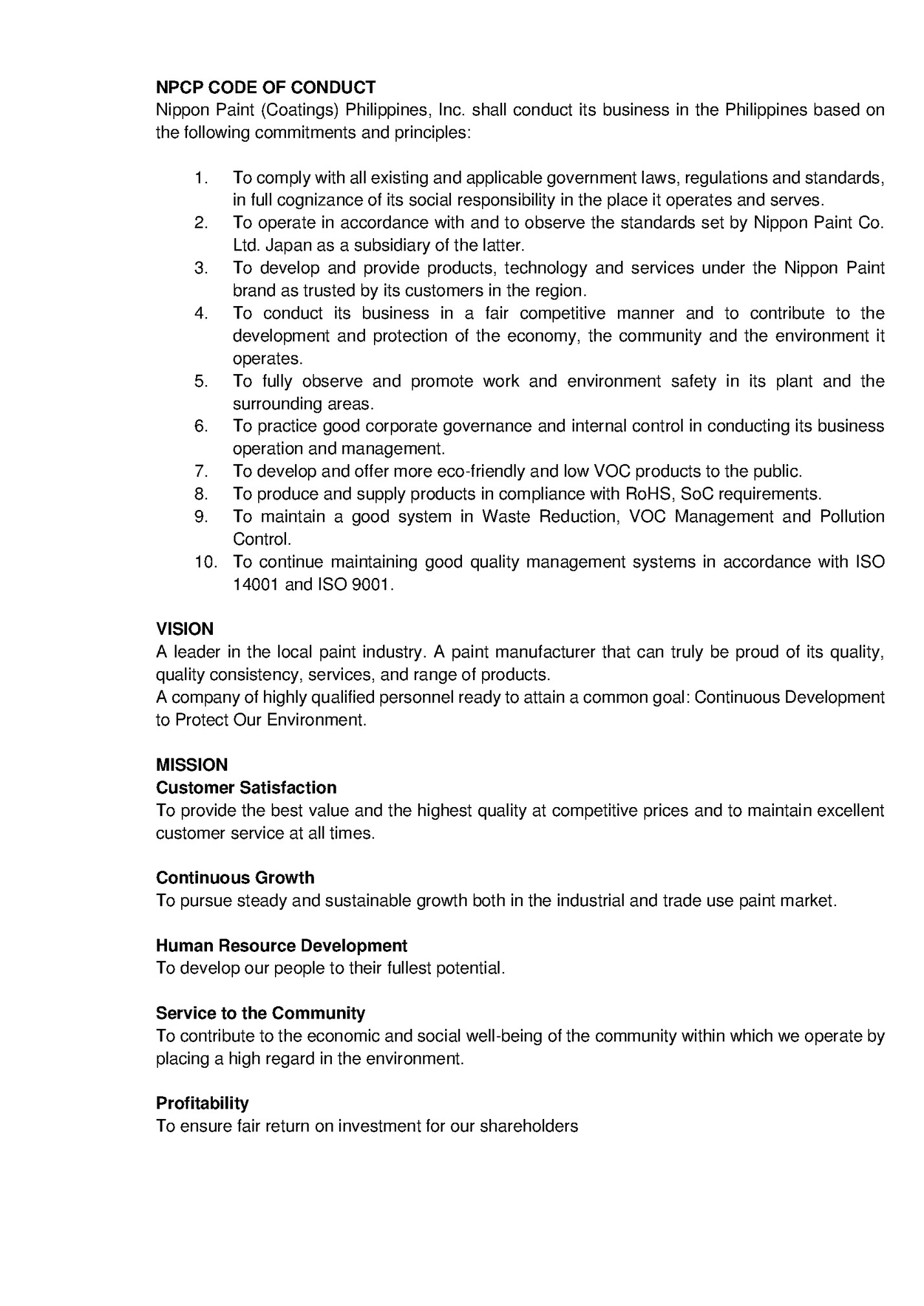
The following specific guidelines are prescribed for Nippon Paint (Coatings) Philippines, Inc. employees. 1. Working with One Another Nippon Paint (Coatings) Philippines, Inc. is committed towards ensuring human rights are respected as per stated in the Commission on Human Rights of the Philippines which are reflected in this Code of Ethics and Business Conduct: a. Diversity and Inclusion b. Freedom of Association and Collective Bargaining c. Safe and Healthy Workplace d. Workplace Security 1.1.1 Treatment of Fellow Employees Treating all employees and others in the workplace with respect and dignity is a part of Nippon Paint (Coatings) Philippines Inc’s. values that apply to everyone. This is particularly important for leaders, who must be role models for their direct reports. Employees are likely to treat their colleagues, including those whom they manage, as they themselves are treated. Nippon Paint (Coatings) Philippines, Inc. expects leaders to seek out the ideas of employees and to involve them in decisions whenever appropriate. At the same time, once a decision is made, everyone involved is expected to pull together and support it. 1.2 Harassment and Violence at the Workplace Nippon Paint (Coatings) Philippines, Inc. believes that employees should be afforded the opportunity to work in an environment free of sexual harassment. Sexual harassment is a form of misconduct that undermines the employment relationship. No employee, either male or female should be subjected verbally or physically to unsolicited and unwelcome sexual overtures or conduct. Nippon Paint (Coatings) Philippines, Inc. will not tolerate any behavior that amounts to sexual harassment and any officer or employee found to have committed sexual harassment shall be subjected to disciplinary action, up to and including dismissal 1.2.1 Safe Space Act (Anti Bastos Law) Policy and Procedure This policy shall apply to all Nippon Paint (Coatings) Philippines, Inc. employees regardless of gender, office location, rank or tenure of service are covered by this policy. The policy likewise applies to all contract work employees, consultants, onthe-job trainees, security guards, janitorial and general services, and such other employees of contractors, visitors, guests, suppliers, and other persons entering the company premises to such extent specifically provided under this policy and/or allowed under the law. The policy also applies during work-related activities, including but not limited to, company functions and events, customer/client or supplier visits of calls, and training, whether the same be conducted within or outside company premises. 1.2.2. Sexual Harassment Policy and Procedure Pursuant to the provisions of Section 4, Republic Act No. 7877, An Act Declaring Sexual Harassment Unlawful in the Employment, Education or Training Environment, and For Other Purposes, the following policies and procedures are hereby issued by Nippon Paint (Coatings) Philippines, Inc. to prevent sexual harassment in its workplace and to provide the procedure for the resolution, settlement and/or disposition of sexual harassment case. 1.2.3 Violence Against Women and Children Policy and Procedure Pursuant to the provisions of Republic Act 9262 or the Anti-Violence Against Women and Their Children Act of 2004, the following policies and procedures are hereby issued by Nippon Paint (Coatings) Philippines, Inc to address the prevalence of violence against women and their children (VAWC) in their home and in the workplace by anyone or by their intimate partners like their husband or ex-husband, live-in partner or former live-in partner, boyfriend/girlfriend or ex-boyfriend/ex-girlfriend, dating partner or former dating partner. 1.2.4 Comprehensive Women’s Right Implementing Rules and Regulations Nippon Paint (Coatings) Philippines, Inc is committed to conform to the established standards assurance of protecting women in the workplace, maintains their health, promote empowerment that pursue equal opportunities for women and men, ensure equal access and practices that perpetuate discrimination and inequality. This policy covers the following rules and regulations: • Human Rights of Women (Magna Carta for Women) • Special Leave Benefits for Women • Solo Parent Leave 1.3 Alcohol-Free, Smoke-Free, Dangerous Drug Policy, and Gambling 1.3.1 Alcohol-Free Workplace Policy and Program Nippon Paint (Coatings) Philippines, Inc. adopts this alcohol-free workplace policy and program ensure a safe and healthful workplace. In this regard, all employees shall abide by the terms and conditions of this policy. The company explicitly prohibits the following: • Use and possession, solicitation or sale of alcohol in the workplace; or • Impairment or under the influence of alcohol which may cause adverse effect on employee’s work performance, safety of co-employees or Company’s reputation. 1.3.2 Smoke-Free Workplace Policy and Program Pursuant to Section 6 of Republic Act No. 9211 which specifically prohibits indoor smoking and protects people against second hand 4
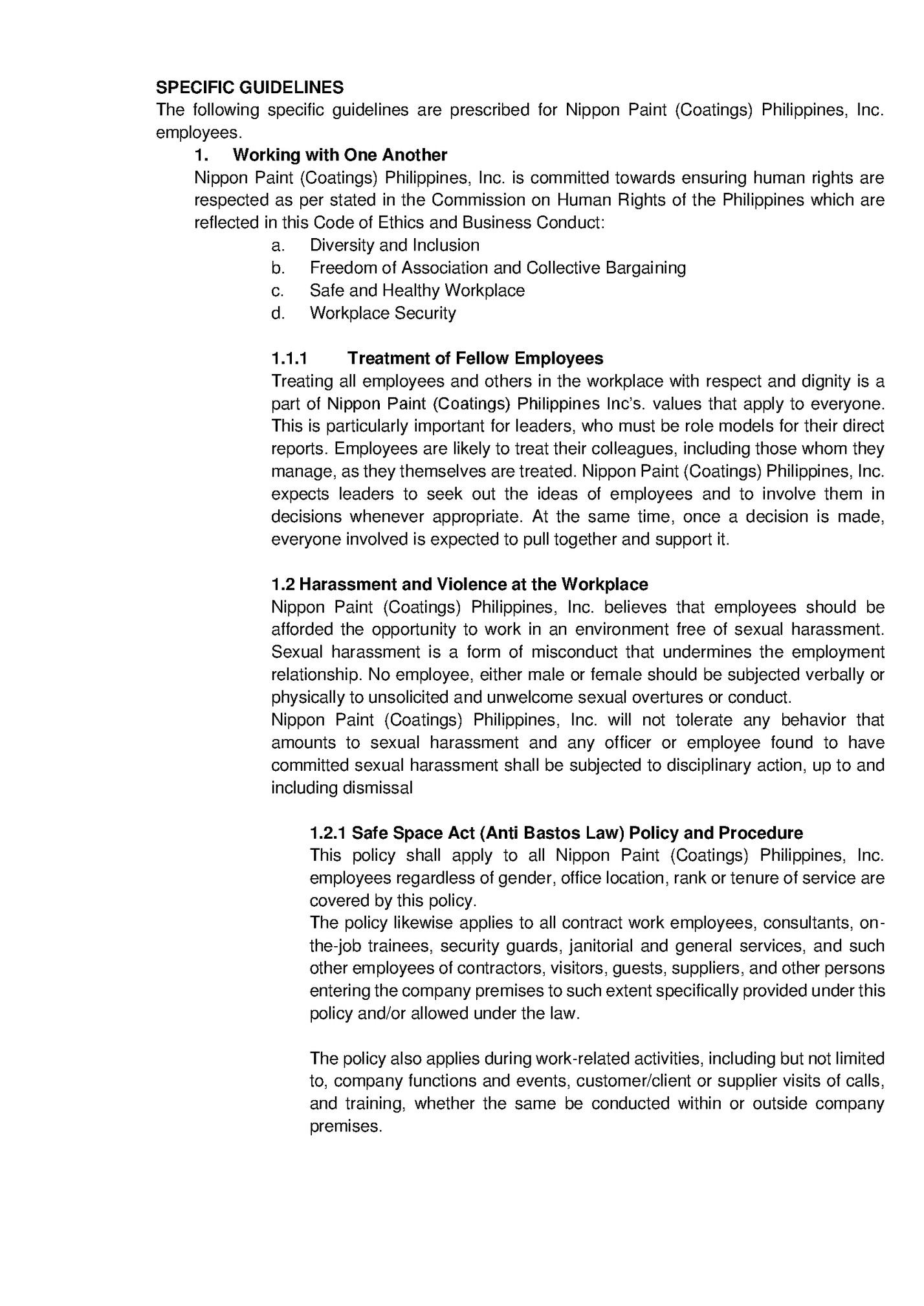
employees and clients against hazard brought about by smoking. • 1.3.3 Dangerous Drug Policy As a standard of business conduct, Nippon Paint (Coatings) Philippines, Inc. proactively advocates a drug-free work environment to protect and safeguard the health and well-being of its employees, ensure safe and efficient business operation, and secure its assets, holdings and properties from detrimental acts of person/s under the influence of illegal drugs. • 1.3.4 Gambling In accordance to our Company Rules and Regulations (CRR), any forms of gambling with or without money involved inside the company premises are strictly prohibited. 1.4 Environmental, Occupational Safety and Health NPCP strives to provide a safe, secure and healthy work environment. All employees must create and maintain a safe working environment to prevent workplace injuries by: • Using all Personal Protective Equipment provided for your protection • Reporting immediately unsafe equipment and tools, hazardous conditions and accidents to the Management • Comply with all Occupational Health and Safety laws and regulations and company’s environmental, safety and health rules and regulations Employees are also responsible for the safety of fellow workers and the general public and are encouraged to promptly report any breaches of environmental, safety and health laws at the workplace. In case of doubt, please seek clarification from your superior. Every employee should take reasonable care to ensure the health and safety of him/her and others who may be affected by his/her acts or omissions at work. Employees should not tamper with, or misuse, any item provided by the Company to secure the safety, health and welfare of its employee and for the protection of the environment. Furthermore, every employee is to strictly observe safety rules notified by Management from time to time. While our work processes and policies are designed to minimize risk, all of us must routinely review and improve workplace conditions to ensure a safe and healthy environment. Unsafe working conditions in Nippon Paint (Coatings) Philippines, Inc. operations are unacceptable and should be reported to the Management immediately. To preserve and protect the environment, all Nippon Paint (Coatings) Philippines, Inc. employees should: • Design and operate the company’s facilities and processes to ensure the trust of adjoining communities. Promote resource conservation, waste minimization and the minimization of the release of chemicals / gas into the environment and promote reuse and recycling activities. Strive continuously to improve environmental awareness and protection. There are a number of environmental laws Nippon Paint (Coatings) Philippines, Inc. must strictly adhere, especially those pertaining to measuring, recording or reporting discharges, effluents and the handling of hazardous waste. Employees whose work areas are impacted by environmental laws should be familiar with these laws, should actively participate in programs designed to facilitate compliance and should immediately report any violations to their superior or the Management. 2. Avoiding Conflict of Interest 2.1 Conflict of Interest Policy and Procedure A conflict of interest arises in any situation when we are taking certain actions or become involved in circumstances that make it difficult for us to perform work objectively and effectively, employee must immediately declare such conflicts to his supervisor/head/HR Department. In situations where conflict of interest could arise, especially when we are taking certain actions or become involved in circumstances that make it difficult for us to perform work objectively and effectively, employee must immediately declare such conflicts to his supervisor/head/HR Department. Hence, it is important for all employees to be aware of this obligation and dutifully declare any interest that may conflict with that of the Company immediately when he/she becomes aware of such an arising. In addition to the Conflict-of-Interest situations reflected on Company Conflict of Interest Declaration and Company Rules and Regulations, without limitations, below are additional situations of Conflict of Interest in which an employee must be aware and mindful of: 1. 2. 3. 4. 5. 6. 7. 8. Invest in non-public companies that are in direct competition or in business with the company; Involve in other concurrent employment or service contract; Engage in business that competes with the company; Receive gifts or other benefits given by interested parties; Approve business dealings with relatives or companies associated with relatives; Take advantage of business opportunity that belongs to the company; Use company assets for personal benefit; Involve in the direct supervision of subordinate who are related or with special relationship. 3. Bribery and Corruption Nippon Paint (Coatings) Philippines, Inc. is committed to maintain the principles of honesty, integrity, and transparency in conducting business. In line with this, the company strictly 5
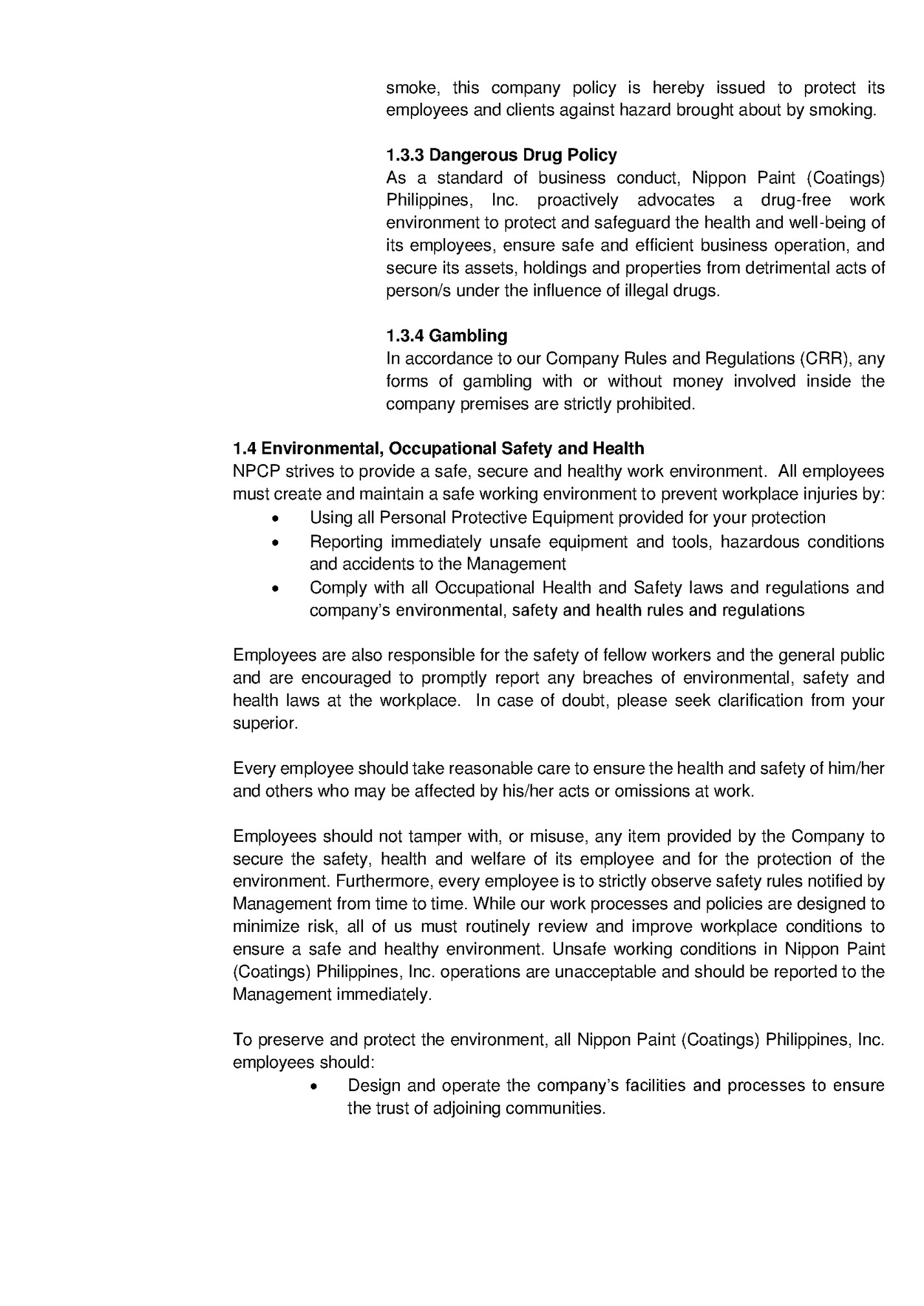
business partners, supplier of goods and/or services, customers, and government agencies. All executives, officers and employees, must be familiar with and at all times, act in compliance with the Anti-Corruption and Bribery Policy and Procedure, with Republic Act No. 3019 (Anti-Graft and Corrupt Practices Act) and with all applicable anti-corruption laws and regulations where their work or service are performed. In other regions where the local laws are stricter than the standards contained herein, the local laws will prevail. 4. Anti-Money Laundering Nippon Paint (Coatings) Philippines, Inc. has zero tolerance approach to money laundering/terrorist financing activities and is committed to implementing and enforcing effective internal controls to counter such activities in accordance to the Republic Act 9160 of Anti-Money Laundering Act of 2001. The purpose of this policy is to provide information and guidance to all employees on money laundering/terrorist financing risks arising in relation to Nippon Paint (Coatings) Inc’s activities, due diligence procedures, and how to recognize and deal with any potential money laundering/terrorist financing issues if they arise. 5. Receiving Gifts or Other Benefits Given by Interested Parties Soliciting, demanding or accepting gifts, gratuities, prizes, trips, favors, goods, services or anything of value, or the giving of gifts, gratuities, prizes, trips, favors, goods, services or anything of value, from or to any person in conjunction with the performance of your duties and responsibilities with NIPSEA Companies. The acceptance and offer of gifts of nominal value and normal business courtesies are permissible in the following situation: a. You may accept normal business courtesies, such as meals, that facilitate the discussion of business, advance good business relations or serve some other demonstrable business purpose. Such courtesies must be within the bounds of good taste, moderation and common sense; b. Gifts, awards, merchandise and/or other incentives of nominal value (generally not exceeding a fair market value of US$100 or its equivalent in local currency) may be accepted from or offered to vendors and customers, as well as potential vendors and potential customers, with whom you maintain an actual or potential business relationship; c. All vendor paid and/or customer paid trips which have entertainment or reward as the primary purpose for the trip (such as cruises, sightseeing, hunting, fishing, golfing, skiing, etc.) must be approved prior to the trip by the employee's immediate supervisor and his/her General Manager, MD or President. In order to approve such a trip, the immediate supervisor and appropriate management level personnel must determine that a valid business purpose exists (such as, advancing good business relations or an appropriate award for a job well done), the fair market value of the trip is not excessive, the purpose or expected result of the trip is not to influence you in future business decisions, and that the trip as a whole is within the bounds of good taste and common sense. 6. Confidentiality Nippon Paint (Coatings) Philippines, Inc. is committed to protecting the confidentiality of its employees and the sensitive information they may have access to in the course of their job duties. We understand the importance of maintaining the trust and confidence of our employees, customers, and other stakeholders, and we are committed to safeguarding the confidentiality of our employees and the information they handle. Nippon Paint (Coatings) Philippines, Inc. confidentiality policy outlines the expectations from its employees with regard to maintaining the confidentiality of sensitive information and the steps it will take to protect this information. 1. 2. 3. 4. 7. To treat Confidential Information as confidential, restricted and privileged. To use the Confidential Information solely for the purpose of carrying out my assigned duties. Irrespective of the reason of why I leave my employ, I undertake to return all confidential information in whatever forms back to the company before my departure. Not to divulge the Confidential Information to anyone or permit it to be used in any way as to prejudice the interest of the company and the Group, its shareholders or directors. Other Acts of Misconduct 7.1 Philosophy on Discipline In order to create a harmonious work environment that allows all employees to achieve their expected performance, strict adherence to the Company Rules and Regulations (CRR) is required and accordingly given disciplinary procedures are implemented. Discipline requires personal self-control and self-direction, knowing what must collectively be achieved. If there is discipline in a business enterprise; Management is effectively able to steer the company forward so that the objectives are attained to the benefit of all employees. Employee discipline is an essential ingredient for the Company’s survival and growth. Every employee is expected to observe the highest standards of accountability, performance, punctuality, honesty, integrity, courtesy, and teamwork, and thus, contribute to the achievement of the Company’s goals. The Company adheres to the principle that the best form of discipline is self-discipline. The Company prefers employees who can discipline themselves without the compulsion of law or fear of punishment. It is not enough that the employee should avoid doing “wrong”–he should, consciously and as a personal commitment “do the right things the right way” for the right purpose at the right time. Although disciplinary action may be imposed for any wrongdoing, the overall intent is more on the prevention of the infraction rather than the administration of the penalty. ARTICLE 1. Coverage – This Code shall apply to all employees of Nippon Paint (Coatings) Philippines, Inc. ARTICLE 2. Uniformity of Penalties – Discipline must be enforced consistently. ARTICLE 3. Impersonal Imposition of Discipline – The imposition of disciplinary action shall be directed against the employee’s wrongdoing, not against his person or personality. The acceptance or offer of cash or cash equivalents, stocks, bonds or other securities, promissory notes, or any similar form of monetary or financial gift is strictly prohibited. 6
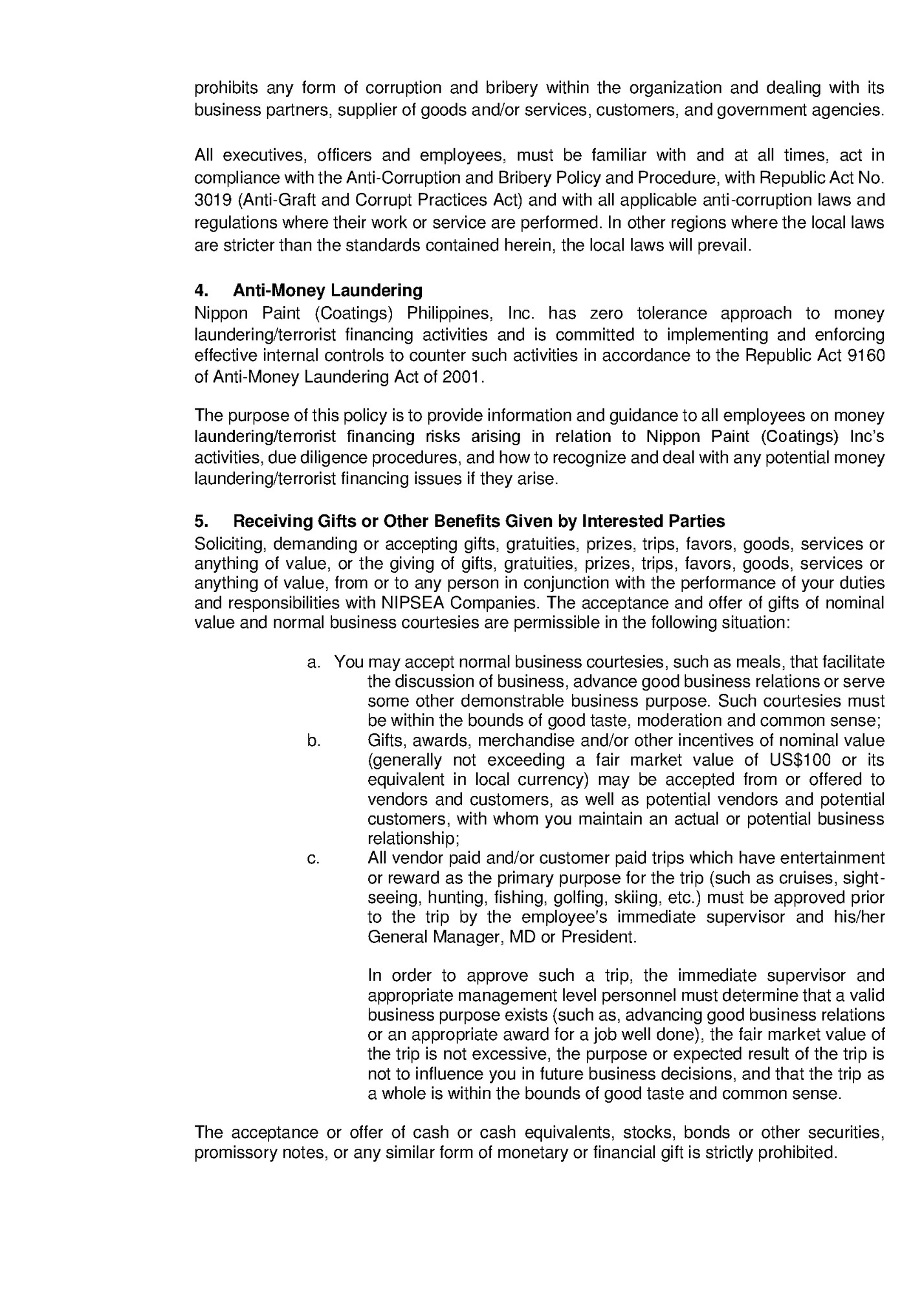
defined in the Code, have been committed in a single event, the penalty for the most serious offense shall be applied. ARTICLE 5. Responsibility of Superiors – It is the duty of every superior to maintain discipline within his area of responsibility. He shall be strictly accountable for the proper discipline and job performance of all subordinates under him, failure of which, he shall be held responsible as provided elsewhere in this Code. Correspondingly, each superior shall be given sufficient authority and power to effectively discharge the foregoing responsibilities. ARTICLE 6. Responsibility of Employees – It shall be the duty of every employee to familiarize himself with all the provisions of this Code. Ignorance of or unfamiliarity with the provisions of this Code shall not excuse any violation thereof. ARTICLE 7. Obligation to Report Wrongdoing – It shall be the duty of every employee to report to management with reasonable dispatch any information in their possession about any offense which has been, is being, or is about to be committed. Failure to do so will subject the employee to the appropriate disciplinary action. ARTICLE 8. Duty of Superior to Act on the Report - It shall be the duty of the superior to act immediately upon all reports of violations, otherwise, he shall be guilty of failure on the job. ARTICLE 9. Effect of Disciplinary Action on Career Improvement – An employee’s record of offenses may diminish or remove an employee’s eligibility for merit increases, promotion, incentives, or similar improvement in his job situation. ARTICLE 10. Imposable Penalties – The following are the imposable penalties under this Code: (a) Written Reprimand (b) Suspension (c) Dismissal, in the imposition of the aforesaid penalties, the Company may consider any mitigating circumstances. ARTICLE 11. Separate Civil or Criminal Action – The imposition of any of the abovementioned penalties shall be without prejudice to any civil, criminal or other actions which the Company may decide to take against the erring employee. ARTICLE 12. Non-Exclusivity – Acts which may not be defined under the offenses specified in this Code but are clearly prejudicial to the interest of the Company shall also be with the appropriate disciplinary sanctions, in consonance with the inherent prerogative of the Company to discipline its employees. This Code does not preclude the Company from applying the just causes for dismissal under the Labor Code and special laws. 7.2 Administrative Procedures In case an "Offense Subject to Disciplinary Action" is committed or supposed to have been committed by an employee, his or her immediate supervisor must promptly investigate the matter. The immediate superior will establish and/or check the facts that will serve as a basis for decisions. He will examine evidence physical or otherwise. He will ask "erring" employee to tell his side by issuing a “Show cause Memorandum” within 5 working days upon discovery of any alleged offense. Employee must give their side in writing within 5 working days from the time of receipt of the show cause memo. HRAD must be receive a copy of all such memorandums that will be issued and likewise with the employee’s reply. If the employee is an active member of the Union, then the Union OIC shall also be given a copy. Upon the submission of the employee’s reply on the issued “Notice to Explain/Show Cause Memorandum”, the supervisor must be open minded, and without any preconceived opinion. Similarly, he will listen to other "sides" which are relevant to the case. All explanations and testimonies should be put in writing for documentation purposes. The immediate superior will analyze and evaluate his findings. In doing so, he will see to it that facts are objective and conclusive. If necessary or advisable, the immediate superior will take steps to preserve the integrity and reliability of evidences. This is particularly true in cases where vital evidences are in danger of being lost or tampered with and thus, he may take custody of physical evidences (including personal property) if required. The immediate supervisor will discuss with his department head (unless he himself is the department head) his findings and recommendations. If the recommended penalty is other than dismissal, the department head will decide whether to approve it as recommended, or increase/decrease it if the circumstances so warrant. In making this decision, the department head will be as fair as possible and he will exercise prudent judgment. He should consult with HRD on matters involving basic policies and/or labor laws and regulations. The decision to impose a disciplinary penalty will be documented by issuing a “Disciplinary Action Memorandum”. All relevant facts and circumstances (date, time, place, persons involved, witnesses, what actually happened, what are the effects and consequences, etc.) must be specified. The memorandum will be submitted for final acceptance by the respective Manager and for HRD’s approval. Upon approval of the disciplinary action memorandum the immediate superior of the employee will implement it. Having it done, the immediate superior will serve a copy of the approved memorandum to the employee and ask the latter to acknowledge receipt of it. If the employee refuses to receive the copy and/or refuses to acknowledge receipt of it, such fact(s) will be annotated on all copies. Administrative Committee is in charge to assess, investigate and make recommendation for appropriate decision and corrective action in order to ensure the expedient investigation of all administrative cases in accordance to the Company Rules and Regulations (CRR). 7.3 Grievance Procedures Grievance may arise from a number of causes such as disciplinary penalties, unsafe working conditions, benefits that the employee cannot avail of for one reason or another or other causes or conditions. Whether the cause is real or imagined, grievance must 7
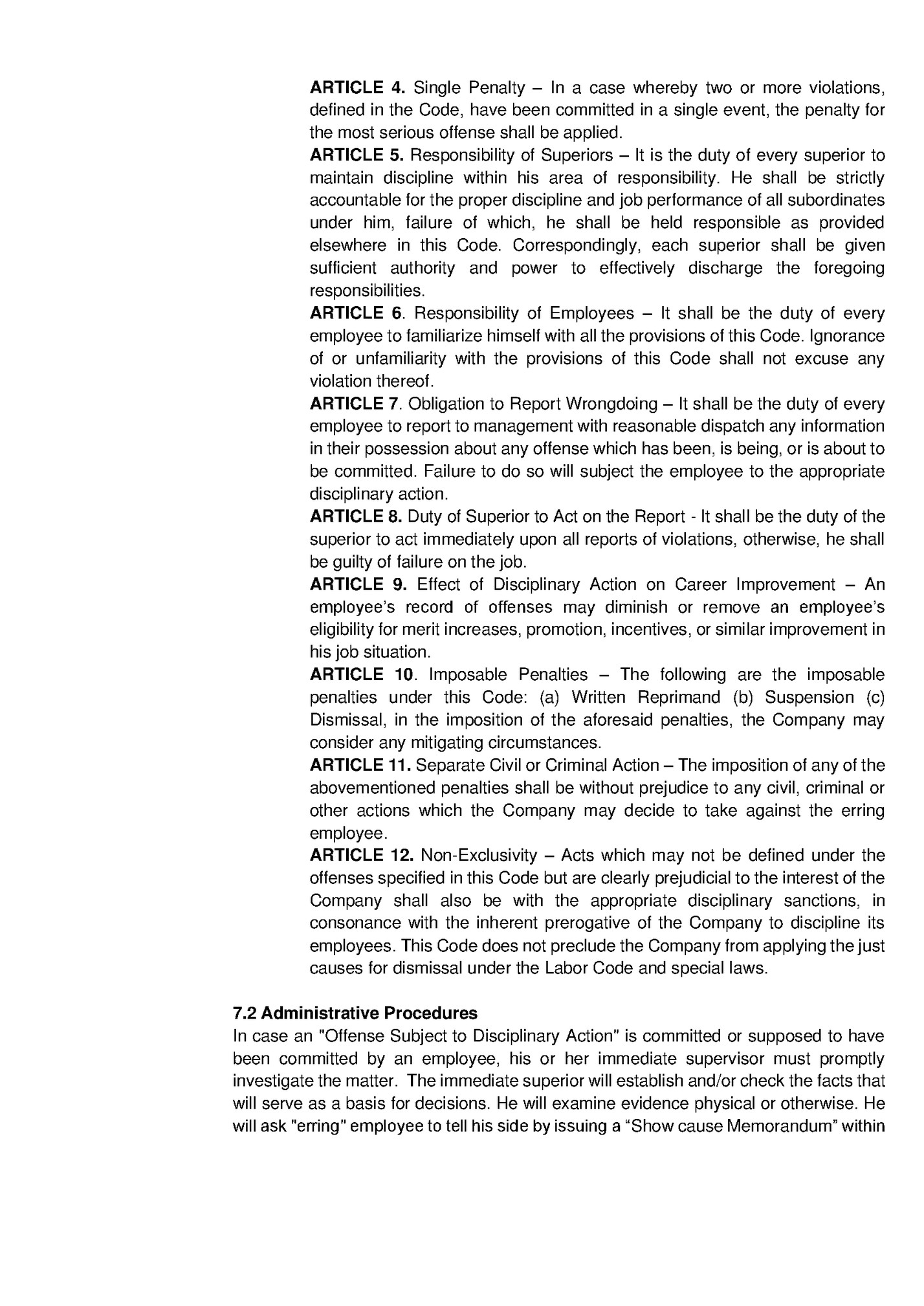
categories. • For grievances of employees covered by Collective Bargaining Agreement (CBA), the procedures are specified in the CBA itself. Employees who are within this category, as well as their superiors, must carefully read and understand the relevant provisions. • For grievances of employees not covered by CBA, the procedures given in this Handbook will be followed. These procedures are very similar to those found in CBA. The differences, if any, will depend on the legal/contractual technicalities involved. There are three levels at which grievances are handled: 1st: Supervisor Level 2nd: Department Head Level 3rd: Corporate level As a general rule, grievance must first be presented in writing and discussed with the employee's immediate superior, who is closest to the situation, the first opportunity to hear and settle the grievance. If unsatisfactorily settled at this level, the employee concerned evaluates it with his Department Head. Grievance unsatisfactorily settled at the Department Level can be appealed to the Office of the Human Resources Manager. This Office handles the grievance in consultation with other Corporate Officers / legal counsel if necessary. Guidelines must be observed in processing grievances: 1. Listening to the version of the employee who presented the grievance with an open mind. If grievance is done in writing, it is helpful to talk with the "aggrieved" employee and ask for elaboration or clarification, taking note of the emotional content of the grievance that is important, if not the crucial factor, in settling the grievance. 2. Establishing the facts of the grievance. In doing so, care must be exercised in differentiating facts from opinions and conclusions in order to avoid being misled. 3. Determining which policy, rule or regulation applies to the particular case. If advisable, consultation is made with HRD or other departments. 4. Evaluating the facts and the "aggrieved" employee's side in the light of the applicable policy, rule or regulation. Defining options that may be taken in resolving the grievance and determining the immediate as well as long-term implications of each option. 5. Discussing further with the "aggrieved" employee to clarify issues and the best resolution. 6. If the resolution is not forthcoming, it should be elevated to the next level up to the 3rd level wherein the final authority to make a decision must/will make a definite position and will communicate it to the parties concerned. 7.4 Offenses and Imposable Penalties It is not possible to list all the forms of behaviors that are considered as misconduct or unacceptable in the workplace. The following are examples of infractions of Company Rules and Regulations that may result in disciplinary action, up to and including termination of employment: 7.1.1 Attendance and Punctuality Reporting for work in accordance with prescribed standard provided for in the Company Rules and Regulations. 7.1.2 Safety, Environment, Security and Housekeeping Failure to observe prescribed health, safety and security standards. 7.1.3 Employee Relations Acts resulting to disruption in the workplace or Company premises. 7.1.4 Company/Employee Property Any act disadvantageous or prejudicial to Company/Employee property. 7.1.5 General Rules and Principles Failure to observe due diligence and work standards required in performance of one’s duties and responsibilities. REPORTING OF VIOLATIONS Any Nippon Paint (Coatings) Philippines, Inc. employee who, in good faith, raises an issue regarding a possible violation of law or Company policy will be protected from any form of retaliation. It is a violation of this code for anyone to be harassed for contacting the General Manager’s Office or the HR and Admin department regarding suspected violation. Employees who feel they are being retaliated against should immediately contact the General Manager’s Office or the HR and Admin department. Contact Information: General Manager’s Office No. 4 Hologram St. Light Industry and Science Park (LISP) 1, Brgy. Diezmo, Cabuyao City, Laguna (049) 543 0763 /64 /66 loc 232 HR and Admin Department No. 4 Hologram St. Light Industry and Science Park (LISP) 1, Brgy. Diezmo, Cabuyao City, Laguna (049) 543 0763 /64 /66 loc 288 Non-Retaliation Policy and Procedure Nippon Paint (Coatings) Philippines, Inc. aims to protect the employees who make good faith complaints against the employer, manager, or co-worker regarding inappropriate or unlawful behavior. The policy aims to promote an atmosphere where employees and others feel safe to express their concerns with the company without apprehension due to the fear of retaliation. 8

Nippon Paint (Coatings) Philippines, Inc. provides a reporting channel for employees to bring any ethical and legal violations that they are aware of, to the Management’s attention so that appropriate action can be taken to address the issue and to minimize the company’s exposure to any damages. This policy reaffirms the company’s commitment to good corporate governance and is intended to provide a framework to promote responsible and secure whistle blowing, without fear of reprisal, discrimination or adverse consequences. When an employee has witnessed or becomes aware of a reportable incident involving ethical, fraud and legal violations, employee may raise the matter to the respective company’s reporting channel: NPCP Whistleblowing mailbox npcp_speakup@nipponpaint.com,ph COMPLIANCE WITH CEBC You must read, understand and comply with the CEBC. If you have any questions, you are responsible for asking your immediate manager/supervisor for clarification. If you believe you have violated the CEBC or any applicable law or regulation, you must report the violation so that the company can take appropriate disciplinary action, if any. In many cases, a prompt report of a violation can substantially reduce the adverse consequences of a violation for all involved – third parties, the company and you. If you become aware that another employee, at any level of seniority has, in all likelihood, violated the CEBC, including nay law or regulation applicable to Nippon Paint (Coatings) Philippines, Inc’s businesses, you have a duty to report that violation so the company can rectify the problem and prevent recurrences. You should report actual or suspected violations to your immediate manager/supervisor, your HR and Admin representative. Such reports will be treated confidentially to the extent possible, and you will not be subject to retaliation for reporting a suspected violation in good faith. RESPONSIBILITIES AFTER LEAVING NIPPON PAINT Employees must not use their position to advance their prospect for future employment, or allow their work to be influenced by plans for or offers of, external employment which would conflict or compromise in any way the interest of Nippon Paint (Coatings) Philippines, Inc. Your professional duty while being employed by Nippon Paint (Coatings) Philippines Inc. was to maintain confidentiality therefore, you must maintain same professionalism and secrecy after leaving the employment of the Nippon Paint (Coatings) Philippines, Inc. and not disclose any official information. Former employees should not use or take advantage of personal, confidential or official information they may have obtained in their capacity as a Nippon Paint (Coatings) Philippines, Inc. employee. STATEMENT OF COMPLIANCE I have received and read the Nippon Paint (Coatings) Philippines, Inc’s Code of Ethics and Business Conduct, and I understand its contents. I agree to comply fully with the standards, policies and procedures contained in the Code and Nippon Paint (Coatings) Philippines, Inc’s related policies and Procedures/ I understand that I have an obligation to report to the Company any suspected violations of the Code that I am aware of. I acknowledge that the Code is a statement of policies for business principles and does not, in any way, constitute an employment contract or an assurance of continued employment. Employee Name ____________________________________ Employee Designation ____________________________________ Department ____________________________________ Signature ____________________________________ Date ____________________________________ Nippon Paint (Coatings) Philippines, Inc. 9

Fleepit Digital © 2021